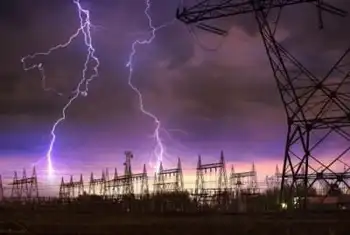Shumlin: Region Can Work With Canada on Renewable Energy
Speaking on a Monday conference call from Halifax, Nova Scotia, Shumlin said a regional collaboration of New England states and eastern Canadian provinces has taken steps to develop a more complete renewable energy portfolio and strengthen the Regional Greenhouse Gas Initiative RGGI.
The development of reliable, "green" energy will have a special focus in Vermont regarding hydropower generated in Canada.
"We're going to leave here with a commitment to work together with the ambassadors here and with the New England governors and Eastern premiers to really push the envelope on the question of how we get green, reliable hydro as an able source of power for New England," Shumlin said.
Shumlin, a first-term Democrat, is attending the 35th Meeting of the Conference of New England Governors and Eastern Canadian Premiers in Halifax along with Administration Secretary Jeb Spaulding. He co-chaired the event with Nova Scotia Premier Darrell Dexter.
According to The Canadian Press, a proposed $6.2-billion project includes installing cables to carry electricity from Newfoundland and Labrador to Nova Scotia. New England states are also seen as potential markets.
Dexter told The Canadian Press he doesn't expect the issue will create a problem at the meeting because the provinces are simply looking out for their own interests. "We represent the interests of our provinces to the best of our abilities and we understand that they don't always run in parallel," he added.
But as Vermont's northern neighbor continues to push ahead with new hydro-generating stations, there remains questions about the state's transmission system not meeting the scale of power coming into the area.
Representatives from the private nonprofit Independent System Operator ISO New England were at the conference to work on the transmission issue. The organization oversees New England's restructured wholesale electric power system under regulation from the Federal Energy Regulatory Commissionl, overseeing more than 320 generators, 8,000 miles of high-voltage transmission lines and 13 interconnections with systems in New York and Canada.
Shumlin said it is too early to say if Vermont will upgrade its transmission lines, but it is clear Canadian hydro-power works as a reliable energy source "when the wind isn't blowing and the sun isn't shining."
In mid-April, the Public Service Board approved a 26-year contract with Hydro-Quebec after members agreed the power price in the contract is expected to remain favorable to market prices and less expensive than current available energy sources with similar characteristics.
Vermont will purchase up to 225 megawatts of energy starting in November 2012 and ending in 2038. The contract also includes a price-smoothing mechanism shielding customers from volatile market prices from Hydro-Quebec, a Montreal-based government-owned public utility with a net income of $2.5 billion.
Shumlin approved the utility agreement.
"This is a great development for Vermont. Hydro-Quebec is selling us cheap, affordable power from a renewable source and we're incredibly grateful that we have such a big source of green power," he told the Reformer in April. "The good news is -- this is a good time to be shopping for power. As the hydro deal shows, we are now buying power from Hydro-Quebec for less money than our current contract that was made many, many years ago. It's a good time to be in the power market."
While at the conference, Shumlin said the New England governors reaffirmed their support for RGGI and "directed their staff" to work aggressively to redefine the requirements through the initiative.
The governor said he favors a solid and careful definition that will spur renewable production and lower the region's carbon footprint.
"So that when we have a debate about whether wind is preferable, as an example, to large biomass, we have a New England definition that is uniform to those questions," he said. "We authorized our commissioners and secretaries to work together to see if a plan should be developed to actually categorize each source of renewable power."
Last week, Shumlin released a statement urging his counterparts across the region to continue support to RGGI, particularly after New Jersey's decision to withdraw from the environmental agreement. In the same announcement, he will pressure the other governors to join him in asking the federal Environmental Protection Agency to recognize the success of RGGI, which was created four years ago as the first market-based regulatory program in the United States to reduce greenhouse gas emissions.
Ten Northeast states have signed on and will attempt to reduce 10 percent of carbon dioxide emissions from the power sector by 2018.
Additionally, Shumlin said the Canadian company Gaz Metro has made a better bid to take over Central Vermont Public Service Corp., than rivaling Newfoundland-based Fortis Inc.
The governor said Gaz Metro, which already owns Green Mountain Power Corp., offers a "better deal" in terms of potential job growth and effect on instate ratepayers and job growth.
The three-day conference concludes this afternoon. Shumlin said the Burlington area will host the 2012 meeting of regional governors and Canadian premiers.
Related News

Canada Extends Net-Zero Target to 2050
OTTAWA - In December 2024, the Government of Canada announced a significant policy shift regarding its clean electricity objectives. The initial target to achieve a net-zero electricity grid by 2035 has been extended to 2050. This decision reflects the government's response to feedback from provinces and energy industry stakeholders, who expressed concerns about the feasibility of meeting the 2035 deadline.
Revised Clean Electricity Regulations
The newly finalized Clean Electricity Regulations (CER) outline the framework for Canada's transition to a net-zero electricity grid by 2050. These regulations aim to balance the imperative of reducing greenhouse gas emissions with the practical considerations…





